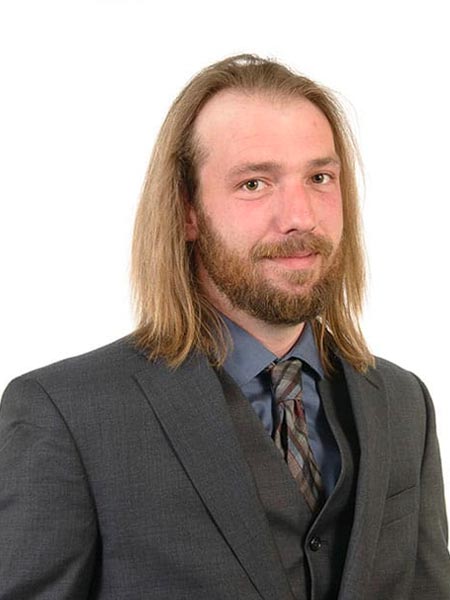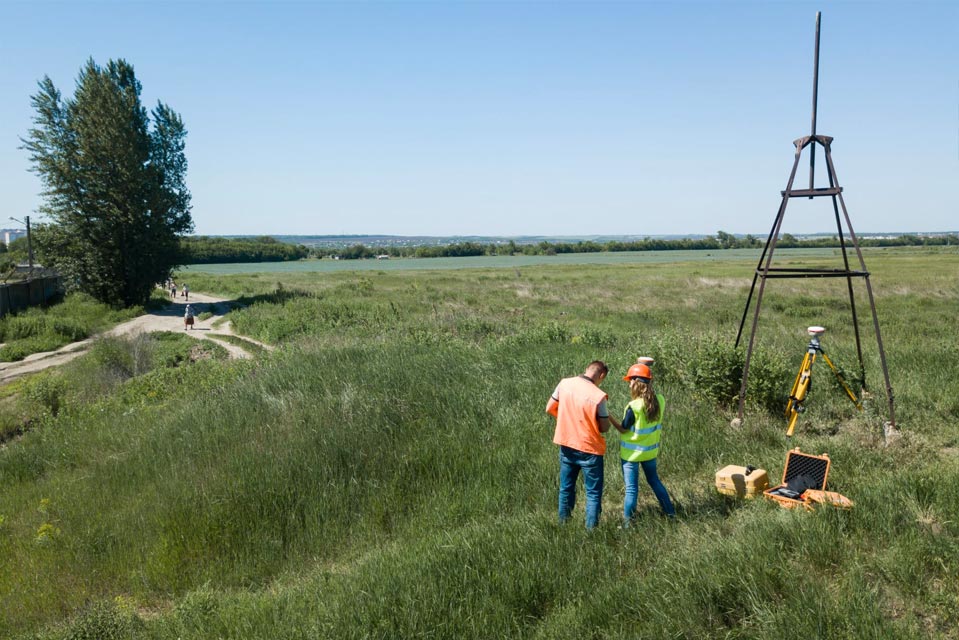
experience
Denver Winchester is a past NSPS YSN president and the Oklahoma Society of Land Surveyors president-elect. He was recently employed as vice president at Crafton Tull, leading the surveying team in the firm’s Oklahoma City office, where he was one of the youngest to ever be named to the position. He holds an Associate of Applied Science in Surveying Technology from Oklahoma State University. He is an expert in riparian boundary surveys and GIS, and he is a certified remote pilot. He became involved in networking for young surveyor professionals because he enjoys connecting with people and helping them build successful careers in the field. His start in surveying came early, as he spent his days after school watching his mom draft. He has more than 13 years of surveying experience with licenses in seven states and experience in a variety of project types, including residential developments, public infrastructure, and energy exploration.
Serving as YSN president, he managed to grow the YSN while strengthening many foundational aspects of the group. He was instrumental in the Young Surveyors organizing the NSPS Student Competition in 2022, further inspiring a new generation of surveyors to excel at a national level. Denver brings practical experience and problem-solving skills to discussions with groups representing other geospatial focuses, both in the United States and internationally.
He hopes to continually attract talent to the industry in Oklahoma by sharing why surveying is a crucially important and fulfilling career. He resides in Oklahoma City with his daughter.
How did you become involved in the field of surveying?
Well, to be honest, surveying was never something I wanted to do. I spent a good chunk of my childhood sitting in a surveying office after school because my mom’s a drafter. I would occasionally help with some stuff whenever she needed help. So, I was aware of what surveying is. Then one day I was just sitting around at a prior job, and I saw an opening for a rodman. I thought to myself, you know I am kind of aware of that, and it might be fun to do that for a little bit. As I started getting a little bit more responsibility, I started finding things that I liked about it. I started realizing I was surprisingly good at it, but I still was not sure this is what I wanted to do. I do not know when exactly I made that decision, but it was around the time when I became a crew chief and started getting more responsibility. I realized that I like the hunt for monuments. I like trying to figure out a puzzle in the field. When I got into the office, that’s when things really changed for me. I obviously still love the field part but moving into the office cemented the fact that I was going to keep doing this.
What are some examples of projects you have worked on and your company’s role in those projects?
I recently have changed jobs but in my prior position at Crafton Tull, we were often called upon to complete surveys on complicated future developments or deal with otherwise complicated issues for our clients. Two jobs come to mind when I think of examples of our survey work.
We did the work for a 1,000-acre development that was in three different counties, four different townships, two railroads, and lest we forget a highway that was done during the infancy of the state DOT. This job was all inclusive for design survey. We did everything from boundary and topography to curative title work for that client. This job presented many hurdles from a lack of records to a blunder on the original survey. It was probably the most diverse job I have ever worked on.
In another job, we were contracted to survey another problematic boundary for a client of ours who only does jobs that no one else is willing to do. It was a ranch that was being split between various parties that ended up being the most complicated boundary of my career. It was only 425 acres, but it was along a river that had been resurveyed in 2004. The ranch encompassed a bunch of other land that had been the center of quite a few court cases back to the early 1930’s including several federal cases. It was in three counties and included the north boundary of a Native American treaty. There were nine government surveys to consult as well as the results from the court cases. In the end, there were 35 new PLSS corners set or found.
How has being professionally licensed help you in your career?
Aside from all the obvious benefits of an increased value of work and upward mobility, I think the unsung benefit of the added trust in work has probably been the biggest benefit to me. It’s much easier to talk to the public and other professionals as a licensed individual because they understand that it means you are an expert in your field.
What advice would you give those who think they may be interested in surveying as a career?
I think I would say if you love law, history, geography, maps, the application of math, the outdoors, or any combination thereof, this could be the job for you. The crossover with other disciplines is tremendous, and the wide variety of surveying means you can definitely find something that works for you. I would say if you are interested, then reach out to a young surveyor and see what it is all about. The YSN is a tremendous resource for getting you in touch with someone who can answer your questions or show you some of the business. This is an amazing career, and we would be happy to have you in it.

What are the parts of your job that you enjoy the most? What are the biggest challenges?
The part of my job that I enjoy the most is when I get to solve an incredibly difficult problem. A perfect example of my favorite type of surveying is riparian surveying and things of that complexity because my favorite part of surveying is the research and law aspects of it. The other part of my job that I really enjoy is getting to teach people that surveying matters and how to do it the right way. Mentoring people and helping them succeed is something that I also enjoy. The biggest challenge is to really explain why surveying is worth it to the outside world, and why it matters to do things the right way. The public does not have a great understanding of surveying and often think that what we do is either unnecessary or overpriced, so I think the biggest challenge is conveying the expertise that we bring to the public.
What are your overall thoughts on the future of surveying?
I think that the future of surveying can be as bright as the people currently in the surveying field want it to be.
I think that the occupation is moving in many different directions and depending on where you’re at and where you work, you are moving more towards GIS or are you are moving to just boundary or construction.
I think that surveying could be in trouble if people are unwilling to put in the work to make surveying valuable. I think an important part of the future is making surveyors a very vital piece to GIS, to title, or to all these other communities that surround surveying. If you leave surveying on an island, it will die. It’s important to make surveying a valuable and central part of the construction business, the real estate business, and the data business.
This starts with investing in and getting people into surveying because obviously those numbers have fallen. There is a small but exceptionally talented and passionate group of young professionals in surveying that are doing an excellent job of selling the benefits and singing the praises of surveying. I see that as being a bolster to the numbers and not something that should be overlooked.
I see a lot of bright futures ahead for the people that I’ve met in my time as the NSPS Young Surveyors Network (YSN) president and in my time at Crafton Tull. I see a lot of missed opportunities that people don’t take because they’re settled in boundary surveying or topographic surveying or other specialties. I just think there’s a lot of opportunity there for the younger generation to take.
I think that the biggest challenges is that we do not sell surveying effectively. We need to sell it to the future generations and sell it to these other organizations. Overall, I really do think that the future is bright given that the YSN or other young professionals I know are doing an excellent job of selling this business, trying new things, and grabbing opportunities when they can. I think that’s a wonderful thing, and I want to be able to help any of them that are willing to do that.

